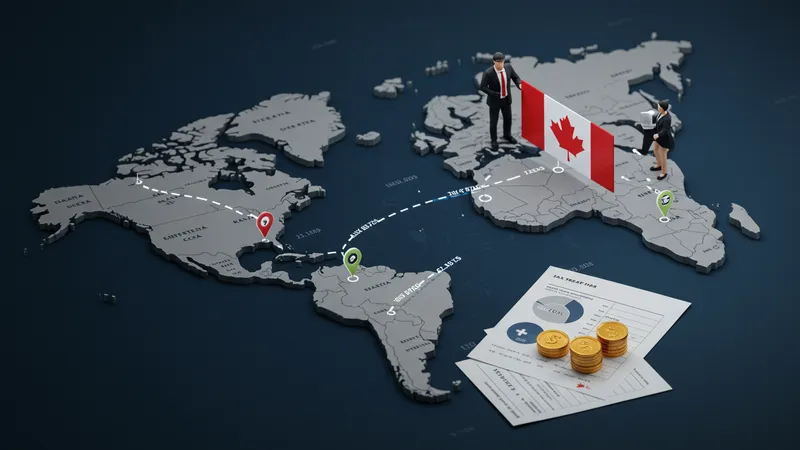

Did you know that the U.S. startups are making a beeline towards Canada for tax benefits? This might be one of the best-kept secrets in the startup world, until now.
With an ever-evolving global landscape, understanding the tax strategies in Canada has never been more pivotal for entrepreneurs. It’s time to discover what they know that you don’t.

While most startups are laser-focused on scaling, savvy entrepreneurs are looking north. The Canadian government offers lucrative incentives, quite different from the U.S. approach. These advantages could redefine how businesses operate and expand. But that’s not even the wildest part...
Many tax professionals argue that Canada's lesser-known fiscal policies can lead startups to success faster than traditional U.S. methods. With its innovation-friendly tax credits, entrepreneurs might save thousands. But, what if we told you there’s a twist that most haven’t realized yet?
What happens next shocked even the experts in the field. Startup founders are finding loopholes in tax treaties between the U.S. and Canada that allow them to minimize expenses significantly. You won't believe how many are leveraging this. Let’s dive deeper into this groundbreaking trend…
Canada's tax incentives aren't only generous; they are designed to foster innovation. The Scientific Research and Experimental Development (SR&ED) program, for example, offers substantial tax credits. Many startups are amazed to discover they can claim tax credits for routine research activities they already perform. But there’s one more twist...

The SR&ED isn't just a one-time benefit. Startups can claim it annually, with many unaware that iterative improvements made to products can qualify them for even more credits. The ripple effect this has on reducing tax liability is staggering when compounded over years. What you read next might change how you see this forever.
Tax experts suggest another overlooked gem is the Canadian Small Business Deduction, which significantly drops the corporate tax rate for small businesses. With a rate of only 9%, startups benefit immensely, freeing up funds for growth initiatives. This is a game-changer for those used to higher U.S. rates.
There’s also an increasing awareness of the differences in capital gains taxes between the two countries. Canadian rules allow business owners to leverage their capital gains more effectively, potentially increasing personal gains when exiting a company. This aspect is what propels many forward-thinking entrepreneurs to consider Canada seriously.
Moving a startup to Canada might seem like a dream scenario, but there are pitfalls entrepreneurs need to navigate. Regulatory differences can pose unexpected challenges. While Canada's bureaucracy is generally perceived as more straightforward, the nuances can lead the unprepared astray. Understanding these hurdles is crucial.

One major challenge lies within the legal structures that vary significantly from their U.S. counterparts. Getting a grip on these can be tricky, and many founders find themselves overwhelmed. But here's the kicker: With the proper guidance, these hurdles can turn into opportunities.
Work permits and visas also present hurdles. It’s not as simple as just moving operations. Founders must comply with immigration laws which can get complex, particularly with family and employee relocations. Yet, strategic planning can alleviate these burdens.
Finally, the hidden challenge of currency fluctuations can surprise startups. As they operate across borders, the exchange rate volatility must be monitored closely. But learning to harness this volatility can lead to unexpected gains. Here's what founders can do next...
Understanding currency dynamics is a vital tool for cross-border startups. The Canadian dollar can present opportunities or risks, depending on its valuation against the U.S. dollar. Savvy founders keep a close eye on these shifts, using tools like OANDA and XE for real-time currency rate insights. But there's an overlooked strategy that smart founders exploit...

Some startups take advantage of forward contracts to lock in favorable exchange rates. By doing this, they remove the uncertainty that comes with currency volatility. This strategy not only stabilizes costs but also assists in accurate financial forecasting. Here's a little-known technique that takes this approach even further.
Leveraging dual banking accounts in both Canadian and U.S. banks can save businesses transaction fees and provide more control over timing currency exchanges. Knowing when to move funds can lead to significant savings. This financial maneuver might just be the key to unlocking greater profitability.
But, perhaps the masterstroke lies in leveraging Canadian investment opportunities, taking advantage of the currency differences to drive higher returns when investing back into the U.S. market. Entrepreneurs are finding this tactic sneaks under the radar of typical strategies, yet yields surprising returns. Ready for more insights?
Besides fiscal benefits, Canada offers a unique cultural advantage that impacts startups positively. The country is consistently ranked among the most multicultural, offering a dynamic market that startups can tap into for diverse consumer insights and a broader market reach. Here's how founders are using this to their advantage.

A cohesive blend of international talent within the Canadian workforce means startups benefit from a myriad of perspectives. This diversity fuels innovation and embraces more inclusive market strategies that connect with global clients more effectively. But that’s just scratching the surface...
Canada’s ecosystem is also known for collaboration over competition, a rarity in many startup hubs around the world. Partnerships form effortlessly with this ethos, which can rapidly ignite growth. Startups find this environment refreshing and rewarding, fostering accelerated development.
Moreover, Canadian cities like Toronto and Vancouver stand out for their commitment to sustainability. Forward-thinking startups align with these values, often attracting investors looking for environmentally responsible business models. Embracing these local values can be a compelling selling point. Curious to know more insights?
Many U.S. entrepreneurs overlook tax treaties between the U.S. and Canada that offer surprising benefits. These treaties can help eliminate double taxation, ensuring businesses don't pay taxes in both countries. When startups explore these avenues, they often find unexpected advantages.

The treaty provisions can apply directly to profits earned, preventing a significant tax hit. This mechanism ensures taxes are paid only in the business' resident country for certain revenues. But here’s an insider tip: not all income is treated equally.
With the assistance of knowledgeable tax consultants, startups can pinpoint the exact types of income that can benefit from these treaties, potentially saving substantial amounts annually. Startups make use of these proceeds to fuel their growth in ways competitors can't anticipate.
What's even more surprising is that these treaties often remain unknown to many industry veterans, creating an opportunity for savvy newcomers to gain a competitive edge. The implications of this are profound, as businesses can redirect savings to strategic expansions. Want more secrets unlocked?
Canadian tax professionals bring insights often overlooked. Their thorough understanding of local intricacies provides startups with a critical advantage. When consulted early in the business setup, these experts can highlight overlooked savings.

With leverage from professionals conversant with international tax laws, startups can ensure compliance while unearthing applicable tax deductions. This collaboration often leads to an efficient financial framework that minimizes obstacles.
What founders often don’t see is how Canadian tax pros spot trends on the horizon — ensuring current strategies align with future regulations. This foresight assures startups aren’t caught off guard by any tax law modifications. It's an often-undervalued strategic move.
Crucially, these professionals offer insights into grant and subsidy opportunities — many unknown to American founders. The value of their experience and networks can lead to financial aids essential to startup survival and scaling. But this is only the beginning of what’s possible...
Technology is transforming how startups manage their taxes. Platforms like FreshBooks and Xero streamline bookkeeping processes, offering integration with Canadian tax systems that cuts hours off tax preparation time. These systems are more than efficient; they’re groundbreaking.

AI-driven insights provided by these applications help founders visualize potential savings and errors long before they occur. Imagine navigating tax complexities with a tool that learns and adapts to the unique aspects of your business. But here's what makes it fascinating...
The automation features mean less manual entry, fewer human errors, and faster invoice reconciliation. Not to mention, they offer data analytics that flags unusual trends, delivering vital insights back to startups for tightening financial models.
Cloud-based accessibility across devices allows startups immediate access to their financial health metrics. This constant monitoring capability translates into confident decision-making — a necessity in today’s fast-paced markets. Transitioning to these digital tools might just redefine your startup’s future.
There's no better way to understand the value of Canada's tax strategies than through real-life examples. Take Digitally Yours, a startup that successfully tapped into Canadian tax incentives to fund a radical product pivot. The result? A revenue increase of 150% within a year.

Another story comes from GreenPath Organics, which leveraged Canadian deductions to enhance their sustainability efforts, thereby attracting a slew of eco-conscious investors. This strategic alignment propelled them to international recognition.
Even blockchain innovators like ChainWave have capitalized on Canada’s favorable tax environment. By establishing a secondary office in Ottawa, they accessed a pool of tech-savvy talent and cut down operational costs by 30%.
These stories emphasize the real-world impact of making smart cross-border moves. By aligning with Canada's ecosystem advantages, startups are not just surviving—they're thriving. Ready to take your strategy to the next level?
The future looks bright for collaborations between U.S. and Canadian startups. These synergies are poised to become more profound as regulatory environments adapt to better facilitate cross-border commerce. Startups that embrace this bi-national approach are set to reap sizeable rewards.

Experts predict a rise in bilateral partnerships; where intellectual talent and resources merge, leading to revolutionary innovations. This insight prompts founders to think beyond borders, harnessing collective strengths. So, what does this mean for up-and-coming entrepreneurs?
The increasing participation of venture capitalists in cross-border investments suggests a more integrated startup economy. Investors are keen to back these collaborative enterprises, recognizing the growth potential that spans continents.
Moreover, programs promoting entrepreneur exchanges provide firsthand experience of each country’s market nuances, creating well-rounded and adaptable business strategies. These ventures highlight the potential flourish in international startup landscapes. Imagine what collaborations could emerge next.
Thinking of making the move? Startups should first evaluate their operational needs and consider the legal aspects involved. Aligning with immigration consultants can smooth the path, ensuring compliance with Canadian entry requirements.

Setting up local partnerships is vital. Working with Canadian mentors or accelerators can provide insights you won’t find in guidebooks, from market demands to customer behavior. Here’s how else you can prepare for a fruitful transition...
Establish clear financial strategies that incorporate the benefits of Canadian tax incentives. An experienced financial advisor familiar with both U.S. and Canadian regulations is indispensable in this venture.
Lastly, engage with local startup communities through events or online platforms, building a network that can offer support and opportunities. This proactive integration into the market lays the groundwork for lasting success. But there’s more to it than just the initial steps.
Choosing Canada as your business base comes with more than just tax benefits. A vibrant quality of life, affordable healthcare, and political stability make it appealing for future company growth. But let’s go deeper.

Founders often cite Canada's strong emphasis on inclusivity as a catalyst for fostering innovative and collaborative environments. This ethos permeates through technology hubs, supporting a wealth of different ideas and creative solutions.
For nature-loving entrepreneurs, Canada offers an unbeatable backdrop—one that fuels inspiration and work-life balance. These aspects may not appear on a balance sheet but can significantly enhance productivity and motivation.
Finally, the continuous investments in technology and infrastructure are positioning Canada as a leader in supporting new ventures. Combining all these factors creates an enticing equation for startups ready to make a bold move. Is your startup ready to embrace this potential?
No move is without its challenges. Navigating legislation can be tricky, and understanding provincial differences is key to smooth operations. Each province has unique aspects that could affect your business model and operations.

Employment laws can also differ drastically. Managing a multinational team may require learning various labor statutes and ensuring your HR practices are airtight to avoid complications later.
Trademarking and intellectual property protections can be another hurdle. These nuances require careful navigation to ensure valuable IP is adequately shielded. Missteps can be costly.
But the surprises in Canada’s legal framework belie opportunities to solidify a legal footing that’s stronger than ever imagined. With the right guidance, these laws can become pillars supporting stable and sustained growth. Here’s the exciting part…
Support systems are plentiful for startups branching into Canada. From governmental initiatives to private accelerators, they cater to various needs and industry focuses. So, where do you begin?

The Canadian Trade Commissioner Service can assist in market entry and expansion, offering crucial insights into regulations and networking opportunities. This wing is more effective than you might realize.
Local incubators and accelerator programs provide an ecosystem to cultivate startups. They not only provide resources but often the funding needed to spearhead innovative projects that would struggle without backing.
Engaging with local support societies like Startup Canada can also connect you with mentors and peers facing similar challenges. The collective wisdom available is invaluable. These networks and resources come together to form formidable support for any ambitious startup.
The journey doesn’t end as you settle in. Formulating strategies for long-term success involves continual adaptation to changing regulations and market demands. Staying agile is key.

One must maintain a pulse on bilateral trade pact adjustments and economic shifts to harness benefits effectively. Regular consultations with tax and legal experts are instrumental in navigating these evolving landscapes.
Furthermore, participate in industry forums to keep informed and connected. This enables anticipation of trends, letting your startup pivot nimbly as needed. Truly, staying informed is non-negotiable for sustainable success.
Finally, capitalize on the diverse talent pool Canada offers, promoting inclusive practices and innovative solutions. It doesn’t just ensure growth but truly maximizes it. And this might just be the decisive difference your startup needs to thrive across borders.
In conclusion, the path U.S. startups take when moving to Canada is as filled with potential as it is with challenges. The tax advantages, cultural diversity, and system support provide a compelling reason to take the leap. A proactive approach and strategic planning will tap into the vast opportunities waiting to be leveraged. Ready to embark on this transformative journey? Embrace the possibilities Canada holds.